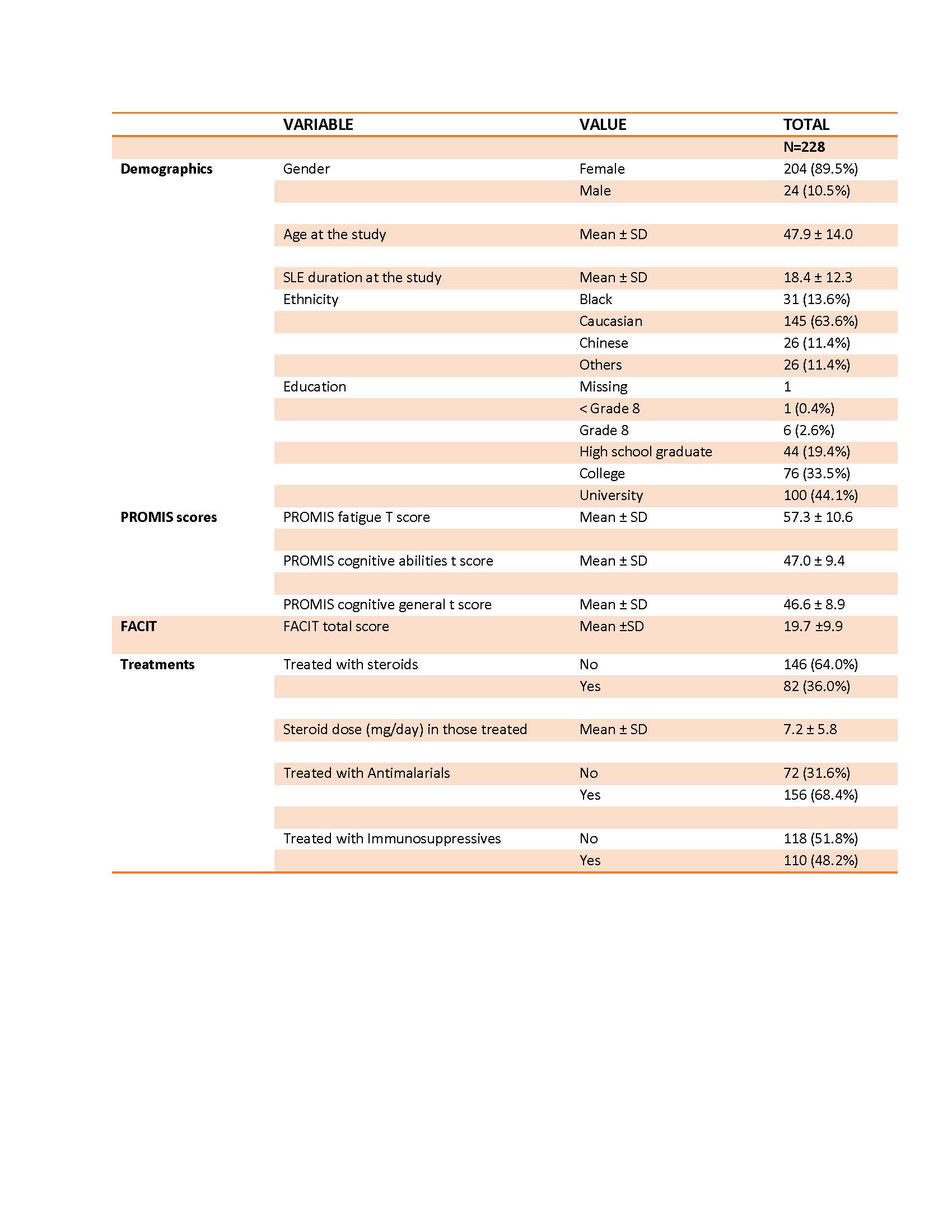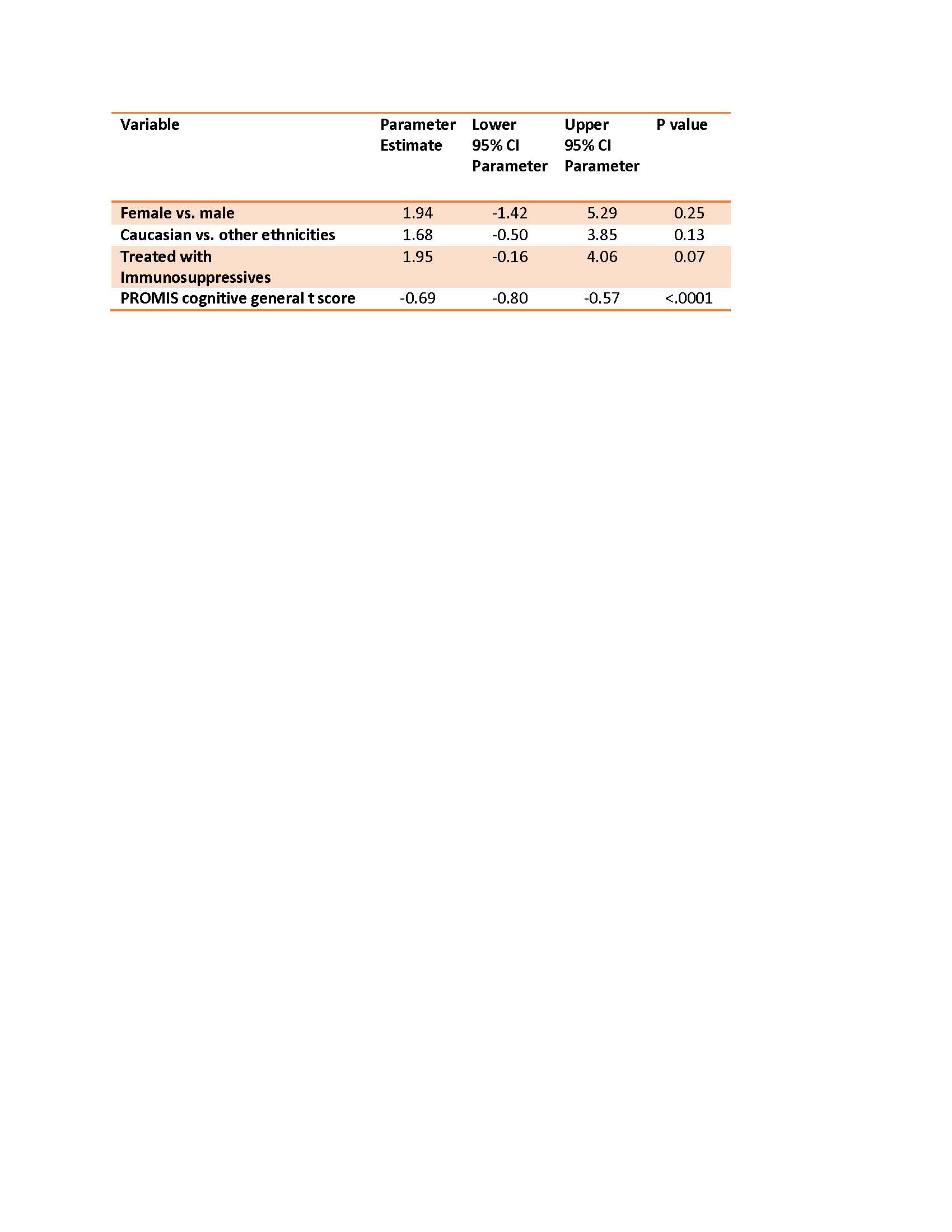Back
Poster Session C
Systemic lupus erythematosus (SLE)
Session: (1440–1485) SLE – Diagnosis, Manifestations, and Outcomes Poster II: Manifestations
1458: Systemic Lupus Erythematosus (SLE) Patients with Cognitive Impairment Experience More Fatigue Compared to Patients Without Impairment
Sunday, November 13, 2022
1:00 PM – 3:00 PM Eastern Time
Location: Virtual Poster Hall
- DL
Delansie Lawrence, MBBS
University of Toronto
Toronto, ON, Canada
Abstract Poster Presenter(s)
Delansie Lawrence1, Jiandong Su1, Andrea Knight2, Kathleen Bingham3, Mahta Kakvan1, Maria Carmela Tartaglia4, Leslet Ruttan5, Joan Wither6, May Choi7, Simone Appenzeller8, Nicole Anderson1, Dennisse Bonilla1, Patricia Katz9, Dorcas Beaton10, Robin Green5, Zahi Touma1 and Michelle Barraclough11, 1Schroeder Arthritis Institute, Krembil Research Institute, University Health Network and University of Toronto, Toronto, ON, Canada, 2The Hospital for Sick Children, Division of Rheumatology, Department of Paediatrics, University of Toronto, Toronto, ON, Canada, 3Centre for Mental Health, University Health Network; Department of Psychiatry, University of Toronto, Toronto, ON, Canada, 4University of Toronto Krembil Neurosciences Centre, Toronto, ON, Canada, 5University Health Network-Toronto Rehabilitation Institute, Toronto, ON, Canada, 6Schroeder Arthritis Institute, Krembil Research Institute, University Health Network, University of Toronto, Toronto, ON, Canada, 7Brigham and Women's Hospital | University of Calgary, Calgary, AB, Canada, 8Unicamp, Campinas, São Paulo, Brazil, 9UCSF, San Rafael, CA, 10Institute for Work & Health, Toronto, ON, Canada, 11Schroeder Arthritis Institute, Krembil Research Institute, University Health Network, University of Toronto, Centre for Epidemiology Versus Arthritis, Division of Musculoskeletal and Dermatological Sciences, School of Biological Sciences, Faculty of Biology, Medicine and Health, The University of Manchester, NIHR Manchester Biomedical Research Centre, Manchester University NHS Foundation Trust, Manchester Academic Health Science Centre, Toronto, ON, Canada
Background/Purpose: Cognitive impairment (CI) is highly prevalent in patients with systemic lupus erythematosus (SLE). Objective prevalence rates are reported as 38% [range: 20% to 80%] and subjective even higher. Additionally, SLE patients frequently identify fatigue as a component of their clinical syndrome. Studies have shown that SLE patients with CI may experience more cognitive fatigue. Therefore, we hypothesized that patients with subjective CI will report more fatigue compared to patients without subjective CI.
Methods: Data on 228 consecutive consenting SLE patients (18 - 65 years old) attending a single centre between July 2018 to July 2020 was analysed. Three PROMIS-CAT (Patient reported outcomes measurement information system - computerized adaptive tests) questionnaires were applied:
- PROMIS Bank v 1.0- Fatigue
- PROMIS Item Bank v 2.0- Cognitive function abilities sub-set
- PROMIS Item Bank v 2.0- Cognitive function general
Additionally, we administered the FACIT questionnaire, which is a 13-item tool that measures an individual's level of fatigue using a 4-point Likert scale. Descriptive analyses were used to describe the patients' characteristics. We studied the association between subjective CI and fatigue measures using a Pearson correlation coefficient matrix. The association between subjective CI (PROMIS cognitive function general) and fatigue (FACIT) was further assessed using univariable and multivariable linear regression analyses, with clinical relevant variables, sex, ethnicity and immunosuppressant use included.
Results: Among the 228 participants, 89.5% were females with a mean age of 47.9 ± 14.0 years. The mean disease duration was 18.4 ± 12.3 years (Table 1).
The mean score for PROMIS Fatigue was 57.3±10.6 and the mean scores for PROMIS cognitive abilities and cognitive general were 47.0±9.4 and 46.6±8.9, respectively (indicating that both fatigue and subjective CI is worse in our SLE cohort compared to the general population). Subjective CI function and fatigue correlated with each other, as patients with more subjective CI displayed more fatigue (Table 2). Multivariable regression analysis confirmed a negative relationship in which a higher PROMIS cognitive general score was associated with lower FACIT total score: adjusted parameter estimate -0.69 (95% confidence interval -0.80 to -0.57), p< 0.0001, (Table 3).
Conclusion: Our results showed that there is an association between subjective CI with higher fatigue levels when measured by the PROMIS Fatigue tool and the FACIT questionnaire. This information highlights how SLE affects both fatigue and subjective CI and that these aspects should be targeted in the multifaceted care of SLE patients.
 Table 1. Patient characteristics at time of study
Table 1. Patient characteristics at time of study
 Table 2. Matrix table summarizing four correlations for cognition and fatigue (N = 228):
Table 2. Matrix table summarizing four correlations for cognition and fatigue (N = 228):
(Pearson correlation coefficient/p value)
 Table 3. Multivariable linear regression result for variables associated with higher FACIT
Table 3. Multivariable linear regression result for variables associated with higher FACIT
total score with cognitive general scores as the main in-dependent variable
Disclosures: D. Lawrence, None; J. Su, None; A. Knight, None; K. Bingham, None; M. Kakvan, None; M. Tartaglia, None; L. Ruttan, None; J. Wither, AstraZeneca, Pfizer; M. Choi, AstraZeneca, MitogenDx, mallinckrodt, Janssen, AbbVie/Abbott, Alimentiv, Amgen, AVIR Pharma Inc, BioJAMP, Bristol-Myers Squibb(BMS), Celltrion, Ferring, Fresenius Kabi, McKesson, Mylan, Takeda, Pendopharm, Pfizer, Roche; S. Appenzeller, None; N. Anderson, None; D. Bonilla, None; P. Katz, None; D. Beaton, None; R. Green, None; Z. Touma, None; M. Barraclough, None.
Background/Purpose: Cognitive impairment (CI) is highly prevalent in patients with systemic lupus erythematosus (SLE). Objective prevalence rates are reported as 38% [range: 20% to 80%] and subjective even higher. Additionally, SLE patients frequently identify fatigue as a component of their clinical syndrome. Studies have shown that SLE patients with CI may experience more cognitive fatigue. Therefore, we hypothesized that patients with subjective CI will report more fatigue compared to patients without subjective CI.
Methods: Data on 228 consecutive consenting SLE patients (18 - 65 years old) attending a single centre between July 2018 to July 2020 was analysed. Three PROMIS-CAT (Patient reported outcomes measurement information system - computerized adaptive tests) questionnaires were applied:
- PROMIS Bank v 1.0- Fatigue
- PROMIS Item Bank v 2.0- Cognitive function abilities sub-set
- PROMIS Item Bank v 2.0- Cognitive function general
Additionally, we administered the FACIT questionnaire, which is a 13-item tool that measures an individual's level of fatigue using a 4-point Likert scale. Descriptive analyses were used to describe the patients' characteristics. We studied the association between subjective CI and fatigue measures using a Pearson correlation coefficient matrix. The association between subjective CI (PROMIS cognitive function general) and fatigue (FACIT) was further assessed using univariable and multivariable linear regression analyses, with clinical relevant variables, sex, ethnicity and immunosuppressant use included.
Results: Among the 228 participants, 89.5% were females with a mean age of 47.9 ± 14.0 years. The mean disease duration was 18.4 ± 12.3 years (Table 1).
The mean score for PROMIS Fatigue was 57.3±10.6 and the mean scores for PROMIS cognitive abilities and cognitive general were 47.0±9.4 and 46.6±8.9, respectively (indicating that both fatigue and subjective CI is worse in our SLE cohort compared to the general population). Subjective CI function and fatigue correlated with each other, as patients with more subjective CI displayed more fatigue (Table 2). Multivariable regression analysis confirmed a negative relationship in which a higher PROMIS cognitive general score was associated with lower FACIT total score: adjusted parameter estimate -0.69 (95% confidence interval -0.80 to -0.57), p< 0.0001, (Table 3).
Conclusion: Our results showed that there is an association between subjective CI with higher fatigue levels when measured by the PROMIS Fatigue tool and the FACIT questionnaire. This information highlights how SLE affects both fatigue and subjective CI and that these aspects should be targeted in the multifaceted care of SLE patients.
 Table 1. Patient characteristics at time of study
Table 1. Patient characteristics at time of study Table 2. Matrix table summarizing four correlations for cognition and fatigue (N = 228):
Table 2. Matrix table summarizing four correlations for cognition and fatigue (N = 228):(Pearson correlation coefficient/p value)
 Table 3. Multivariable linear regression result for variables associated with higher FACIT
Table 3. Multivariable linear regression result for variables associated with higher FACIT total score with cognitive general scores as the main in-dependent variable
Disclosures: D. Lawrence, None; J. Su, None; A. Knight, None; K. Bingham, None; M. Kakvan, None; M. Tartaglia, None; L. Ruttan, None; J. Wither, AstraZeneca, Pfizer; M. Choi, AstraZeneca, MitogenDx, mallinckrodt, Janssen, AbbVie/Abbott, Alimentiv, Amgen, AVIR Pharma Inc, BioJAMP, Bristol-Myers Squibb(BMS), Celltrion, Ferring, Fresenius Kabi, McKesson, Mylan, Takeda, Pendopharm, Pfizer, Roche; S. Appenzeller, None; N. Anderson, None; D. Bonilla, None; P. Katz, None; D. Beaton, None; R. Green, None; Z. Touma, None; M. Barraclough, None.

